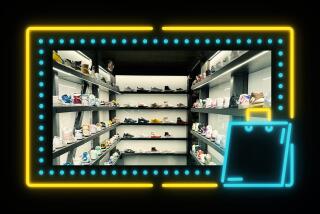Tool Time & More
- Share via
Rompage Hardware might be at home on Main Street, Anytown U.S.A., but in the midst of Hollywood Boulevard’s liquor outlets, used car lots, massage parlors and wig emporiums, it seems like a relic. It’s the kind of mom-and-pop store you might see re-created for a period film: hazy lighting, crowded aisles piled high with archaic stock, cozy groups of chatty employees and customers who look like they might live there. Only the buzz of the cashier’s computer scanner discloses its place in the present.
Open for business since 1914, Rompage is not only the oldest hardware store in the city, but was also named the best by Los Angeles magazine and KNBC-TV Channel 4 because of its seasoned salespeople and their ability to fulfill even the most off-the-wall requests. But friendly, expert service is no longer enough to keep up with the giants in the industry like Home Depot and Orchard Supply Hardware. Changes are being made so that the store doesn’t have to get by on charm alone, in what may be a mini-lesson regarding retailing in the ‘90s.
Owner Richard Scantland, who took over the store from Paul Rompage in 1958, admits that these changes are causing hardship. “We’ve been forced to really examine ourselves as retailers for the first time,” he says. This has led to computerization and constant monitoring of things that seemed to take care of themselves in the past, like inventory and profit margin. Rompage does get assistance in computerization, advertising and the like as a member of True Value, a hardware cooperative.
Since the 1994 earthquake, Rompage’s market share has dropped even more because of the many low-income apartment buildings in the area whose owners, once loyal customers, could not afford to rebuild. To keep new customers coming in, Scantland undercuts the big chains’ prices on key items like locks, gaffer’s tape and power tools, which he says causes Rompage to run at a profit margin 3% to 8% lower than its competitors. “We’ve got to change with the times,” he says. “But we’re nostalgic for a way of life that has, unfortunately, been lost.”
Tom Ware, general manager in charge of pricing and inventory, comments that the store is seeing more changes now than it has during his entire 40 years on the job. “You’ve also got things like home shopping channels and the Internet entering the market now,” he says. “But there are still going to be those people who want to come in and see a real person and gab a little.”
Part of Rompage’s homey ambience has to do with leaving people to their own devices, and a lot of customers cherish the freedom to wander the aisles aimlessly. But if you’re daunted by the seeming disarray or the sheer quantity of items available, track down someone like Marilyn Stankiewicz, one of 47 employees, who’s been wandering those aisles for 23 years.
“All this stuff might seem strange to someone coming in off the street, but every single thing here means something to me,” she says, pointing out a confounding mass of discontinued and vintage hinges, fittings, moldings and window accessories. Now that post-earthquake rebuilding is picking up in Hollywood, these items allow owners to redo their 1920s bungalows or post-World War II apartments with original fixtures, which may be Rompage’s biggest edge over its competition.
Duke Milroy, who has presided over the plumbing department (perennially the store’s top-selling one) for 13 years, has a different view about the store’s strength. “The best thing about it is the funny help,” he says. Paint expert John Pappas has a more therapeutic vision of his role. “We listen to everyone’s problems,” he says, “because we have none at all, and we’ve got big ears.”
Stankiewicz is set on the basics, though: “We make sure we have things other stores don’t.” She indicates the store’s supply of wood-burning stoves and accessories to illustrate her point.
*
Enter Suzy Trumpower, who heads up the special ordering department. “I’m good at finding the weird stuff,” she says, looking up a replacement part for a discontinued electric sanding device in one of the immense catalogs from the 200 suppliers she works with. She’s also in charge of the archives upstairs--a heady realm of hoarded treasures from the hardware past, including window cranks, curlicued old plumbing parts, Art Deco light fixtures and one of the first attempts at an edger, which looks like a lawn mower that’s been cut in half.
Stankiewicz’s daughter, Kathy, works at Trumpower’s side, packing and shipping. Kathy, 24, who’s been working at Rompage since she was 12, says, “Everyone gets along so well that you can get away with a lot of things you wouldn’t be able to elsewhere.”
And this is the way Scantland and Ware prefer it. “It’s a family store,” Ware says, “so you don’t have to run it on a corporate structure. We’re flexible with schedules and personal issues.”
Company controller Lolita Lotee has taken advantage of this flexibility by selling her own line of clothing at the store, which makes Rompage the unusual hardware venue where you can pick up a $3.99 embroidered peasant blouse or a $70 beaded evening gown to go with your hand drill. Lotee, who once owned a clothing factory in the Philippines, says a lot of women come in with their husbands now just to see what’s new on her racks.
There are no plans of expanding into lingerie, but Ware says the store will have to zero in on niche markets to survive. And count on good service as a selling tool. He’s aware that “knowledgeable industry people are dying off. We carry 80,000 items, and it takes a long time to amass the expertise needed to deal with all that.”
Still, Scantland is confident of Rompage’s staying power. He points out the original 1914 vertical sign that still hangs outside the store. “That’s typical of the hardware trade,” he says with a laugh. “Nothing gets thrown away.”
More to Read
Inside the business of entertainment
The Wide Shot brings you news, analysis and insights on everything from streaming wars to production — and what it all means for the future.
You may occasionally receive promotional content from the Los Angeles Times.










